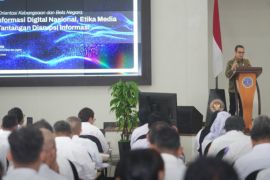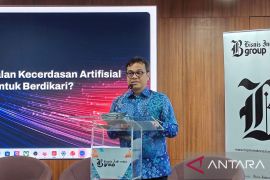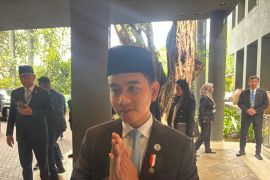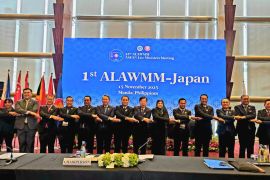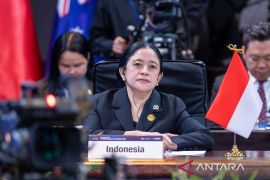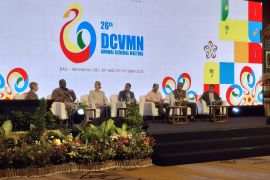The issue is not limited to Indonesia's annual losses of about US$8 billion from online gambling, as Prabowo mentioned, but also points to a dangerous global trend of unchecked digital practices.
Besides gambling, crimes such as cyber fraud, data theft, and illegal online trading continue to erode state revenue, disrupt financial stability, and weaken public trust worldwide.
Prabowo's warning is therefore timely. Without stronger international cooperation and shared digital ethics, the threats could undermine not only national economies but also the integrity of the global digital ecosystem that supports modern connectivity.
To counter those risks, Indonesia can promote a global framework that ensures transparency, accountability, and fairness in digital governance.
By advocating ethical artificial intelligence (AI) standards, stronger data protection, and inclusive capacity building for developing nations, Indonesia can help ensure that technological progress remains human-centered and supports collective well-being, not just concentrated power.
Such efforts must begin with recognizing that today's digital challenges extend far beyond economic losses. The unchecked growth of AI, data exploitation, and algorithmic manipulation could deepen global inequality, spread misinformation, and erode ethical norms.
An unregulated digital ecosystem often benefits a few technologically dominant players, leaving developing nations dependent and exposed.
High-income countries, through measures such as the EU's AI Act and U.S. tech dominance, increasingly shape global digital governance. Yet, these frameworks often reflect Western priorities, making developing countries passive consumers.
Users worldwide are also vulnerable to opaque algorithms embedded in imported apps, cloud services, and AI tools they cannot fully examine or regulate.
Such imbalance risks fostering digital colonialism, where innovation and data flow outward from developing countries without fair returns or safeguards.
A Global South perspective
To address these challenges, the world needs a digital governance framework led by the Global South.
This ethical, inclusive, and human-centered approach seeks to ensure that AI benefits society rather than reinforcing corporate control.
Such a framework would reflect the realities and values of developing nations, where technology should empower rather than exploit.
Indonesia has signaled this shift through Coordinating Minister for Economic Affairs Airlangga Hartarto, who highlighted the "human-centered AI" principle at the APEC Summit, emphasizing ethics over unrestrained innovation.
Hartarto's statement represents a step toward positioning Global South countries as active participants in shaping global AI ethics.
Indonesia's diplomatic strategy, linking AI ethics to issues such as online gambling and cyber fraud, reflects a vision of treating technology not merely as a technical or regulatory matter but as a moral and socio-economic challenge.
Thus, Indonesia can frame digital transformation as an issue of justice, sovereignty, and human dignity — values strongly shared across the Asia-Pacific and the Global South.
Many developing nations share Indonesia's experience in tackling cross-border cybercrime, misinformation, and technological dependency, showing the need for collective action grounded in a shared ethical foundation.
Indonesia is well-positioned to lead such efforts, drawing on its credibility as a bridge between developed and developing worlds.
Through forums such as APEC, ASEAN, the Non-Aligned Movement (NAM), and BRICS, Indonesia could propose a Global South AI Ethics Charter promoting cooperation based on transparency, inclusivity, and human well-being while reflecting regional cultural and social values.
Such an initiative would enable Indonesia to turn its domestic commitment to ethical AI into a global movement for equality, digital sovereignty, and shared prosperity.
Domestic efforts
Domestically, Indonesia has taken concrete steps to strengthen its ethical foundation for AI governance.
Communication and Digital Affairs Minister Meutya Hafid said her ministry is drafting regulations governing the adoption of AI, prioritizing ethics and security through the National Artificial Intelligence Roadmap White Paper.
This roadmap will serve as the country's foundation for adopting AI technology, followed by derivative regulations to ensure implementation.
Deputy Minister Nezar Patria said the roadmap aims to balance innovation with protection from AI-related risks. He stressed that robust governance is essential to ensure AI benefits both society and the national economy.
The government's stance underscores transparency, accountability, and "trust from the beginning" as core principles.
By embedding privacy, security, and fairness into AI systems, Indonesia aims to develop technology aligned with cultural values and human well-being, paving the way for inclusive and responsible digital transformation.
With this foundation, Indonesia is positioned to lead developing countries in advocating ethical AI governance.
The next step is to transform domestic principles into international cooperation through regional and multilateral dialogues.
Indonesia could, for instance, propose a Developing Countries AI Ethics Forum, capacity-building programs, and a shared regulatory framework emphasizing fairness and data sovereignty.
Through ASEAN, NAM, and BRICS, Indonesia can promote shared ethical standards that safeguard human rights and digital equality, strengthening developing countries' voice in shaping a balanced global digital order.
These efforts reinforce Indonesia's message: technology must serve humanity, not exploit it.
From addressing online gambling to guiding AI ethics, Indonesia shows that moral responsibility and innovation can go hand in hand.
With inclusive diplomacy and strong domestic policy, Indonesia offers a model for ensuring that technology becomes a force for justice, equality, and shared prosperity in the digital age.
Related news: AI a game changer in global vaccine development: CEPI
Related news: Indonesia pushes ethical AI agenda at 2025 APEC Summit
Translator: M Razi Rahman, Cindy Frishanti Octavia
Editor: Anton Santoso
Copyright © ANTARA 2025

